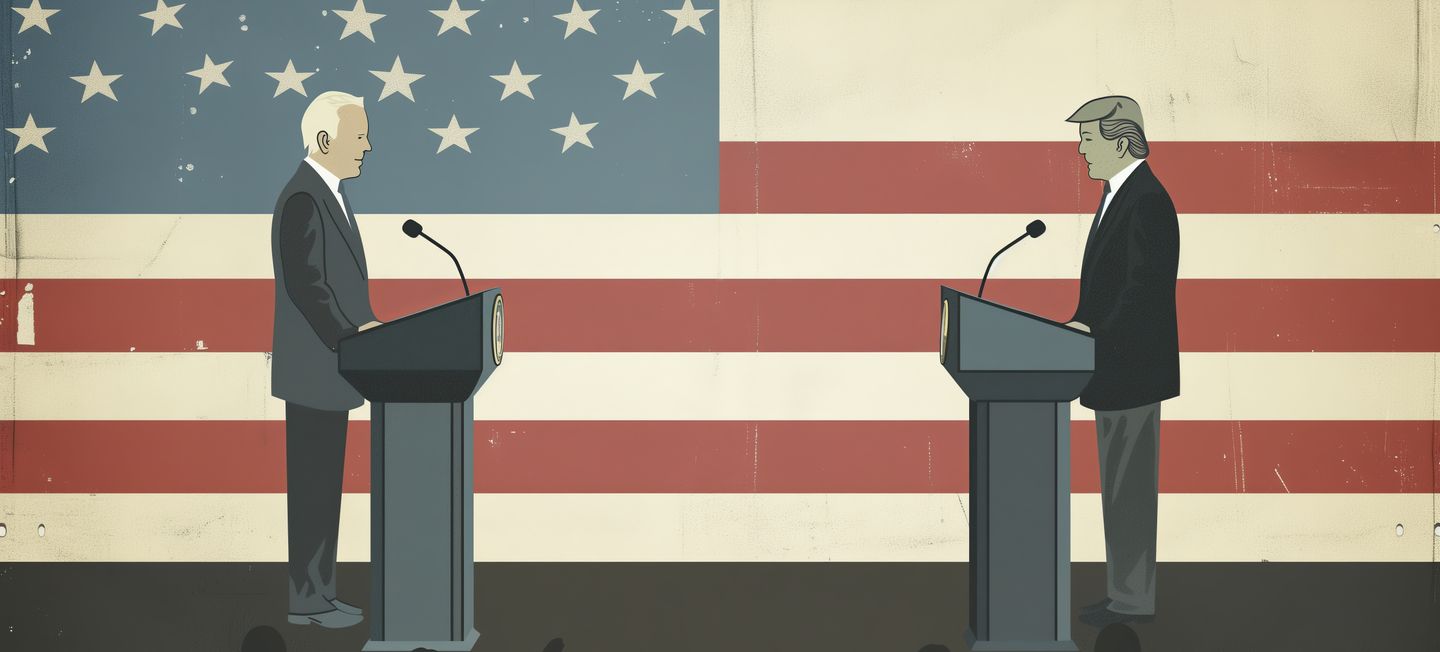Moderators should point out factual errors in real time, Americans say in poll on eve of presidential debate

Illustration: Adobe Stock
On the eve of the first of two planned presidential debates between Joe Biden and Donald Trump, more than two out of three Americans say moderators should point out factual inaccuracies in candidates’ comments during the debate, according to a new Media & Technology Survey from Boston University’s College of Communication, out today.
Support for fact-checking in real time is stronger among Democrats (81% agree or strongly agree) than Republicans (67%), the survey finds.
“Support for moderators pointing out errors is bipartisan and relatively high across the board,” said Tammy Vigil, PhD., senior associate dean and associate professor, media science, at Boston University’s College of Communication. “Still, the results imply that Democrats either may value verifiable information more than the Republican counterparts, or that they think live fact checking would significantly benefit their candidate or harm the opposition.”
Similarly, strong majorities from both parties favor debates designed by independent, nonpartisan organizations, though support is stronger among 78% of Republicans (78% agree or strongly agree) compared to Democrats (69%) and independent voters (63%).
“This year, much like in 1960 and before, the presidential debates are not going to be governed by an outside body but designed by television networks and campaign staffers – something the survey suggests is not what members of either party want,” Vigil said. “People may simply be more comfortable with having an independent organization running the show since that is how things have worked for most of the history of debates. Or voters may not trust media outlets to run debates in a fashion that is balanced and informative.”
Traditionally, presidential debates are held in the fall, but a plurality of respondents – both Democrats (49%) and Republicans (48%) — agree or strongly agree that holding debates in the summer will make them more informative.
Americans overwhelmingly agree (66%) rather than disagree (6%) that presidential debates are good for democracy, the survey says. Notably, 71% of Republicans and 76% of Democrats agree or strongly agree on this but only 47% of independent voters do.
Vigil found a surprising amount of common ground between Republicans and Democrats on the topic of presidential debates, despite the country’s deep political polarization.
“As a persistent part of the presidential electoral tradition since the 1970s, the debates have provided shared moments of cultural and political history,” Vigil said. “Members of both major parties seem to appreciate the history and potential importance of this time-honored tradition and intend to participate as observers.”
Twice as many people say they intend to watch the presidential debates (54%) compared to those who did not (24%). But candidates hoping to reach independent or non-white voters, Vigil said, may be disappointed: 30% of independents, 32% of Black, 28% of Hispanic and 36% of “other race” respondents say they don’t intend to tune in.
“If independent voters, who we assume are most likely to be swayed by debates, are showing little interest in watching them, the wisdom of moving the debate earlier in the calendar can be questioned,” Vigil said. “Undecided voters have often waited until late in the general election to make up their minds, so the summer debates might just be speaking to decided partisans.”
This month’s Media & Technology survey was conducted June 10 to 11, 2024, using Ipsos eNation Omnibus, a nationally representative online survey that measures attitudes and opinions of 1,005 adults across the United States.
Survey Summary
The Media & Technology Survey asked: How much do you agree or disagree with the following statements regarding the U.S. presidential debate?
I intend to watch or listen to the June presidential debate.
Strongly Disagree: 12%
Disagree: 12%
Neither Agree Nor Disagree: 23%
Agree: 33%
Strongly Agree: 21%
Holding presidential debates during the summer will make them more informative for voters.
Strongly Disagree: 4%
Disagree: 8%
Neither Agree Nor Disagree: 43%
Agree: 33%
Strongly Agree: 12%
Debate moderators should point out factual inaccuracies in candidates’ comments during the debate.
Strongly Disagree: 4%
Disagree: 6%
Neither Agree Nor Disagree: 21%
Agree: 36%
Strongly Agree: 33%
An independent, nonpartisan organization should design the presidential debates instead of media organizations working with campaign staffers.
Strongly Disagree: 2%
Disagree: 3%
Neither Agree Nor Disagree: 27%
Agree: 37%
Strongly Agree: 31%
Presidential debates are good for democracy.
Strongly Disagree: 3%
Disagree: 3%
Neither Agree Nor Disagree: 27%
Agree: 44%
Strongly Agree: 22%
About the Media & Technology Survey
The Media & Technology Survey is an ongoing project of the Communication Research Center (CRC) at Boston University’s College of Communication. This month’s poll was conducted in English on June 10 to 11, 2024, using Ipsos eNation Omnibus, a nationally representative online survey that measures attitudes and opinions of 1,005 adults across the United States. This online survey has a credibility interval (CI) of plus or minus 3.5 percentage points. The data were weighted to the U.S. population data by region, gender, age and education. Statistical margins of error are not applicable to online polls. All sample surveys and polls may be subject to other sources of error, including, but not limited to coverage error and measurement error.


